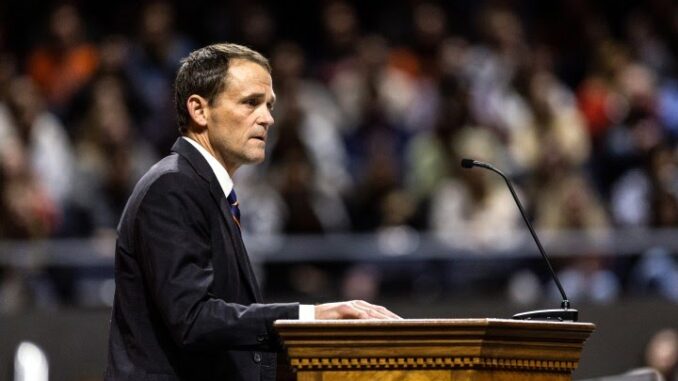
**Charlottesville, VA** – In a stunning development that has sent ripples through the academic community, Dr. Emily Carter, president of the University of Virginia (UVA), announced her resignation on Monday, effective immediately. Her departure comes at a time when the institution is under scrutiny by the Trump administration’s Department of Education concerning its diversity, equity, and inclusion (DEI) initiatives.
Dr. Carter, who had served as president for the past three years and was lauded for her progressive stance on social issues, cited “personal reasons” for her resignation. However, insiders have indicated that the ongoing federal investigation into UVA’s DEI programs played a significant role in her decision.
Since entering office, Dr. Carter has been a vocal advocate for DEI policies at UVA, launching initiatives aimed at promoting inclusivity and enhancing the representation of marginalized communities within the student body and faculty. She positioned these initiatives as essential to the university’s mission of fostering a learning environment that reflects a diverse society.
However, the political landscape shifted dramatically after former President Trump announced his bid for the White House in 2024. His administration has made it clear that they intend to roll back what they see as “woke” policies in higher education, placing a particular emphasis on scrutinizing DEI programs. The Department of Education launched an investigation into several universities, including UVA, examining whether these programs violate federal law or perpetuate discriminatory practices.
In a statement released by Dr. Carter, she expressed pride in the progress made during her tenure but acknowledged the challenges posed by the current political climate. “I believe deeply in the values of diversity, equity, and inclusion, and I have devoted my presidency to upholding these principles,” she said. “However, at this juncture, I feel it is in the best interest of the university and its community for me to step aside.”
The announcement has prompted a wave of reactions from faculty, students, and alumni. Many voiced their disappointment and concern over the political pressure facing the university. Dr. Michael Henderson, a tenured professor of sociology, commented, “Dr. Carter brought a vision and a commitment to social justice that was sorely needed at this institution. Her resignation is a loss for us all and raises serious questions about academic freedom in the face of political intimidation.”
Students, too, have expressed feelings of uncertainty and apprehension. Sarah Mitchell, a junior majoring in Political Science, remarked, “This feels like a setback for our community. We’ve worked hard to foster an inclusive environment, and with Dr. Carter stepping down, I worry that all that progress might be undermined. This is about more than just one person; it’s about the future of our university.”
Meanwhile, conservative groups have lauded the resignation as a victory for their cause. Figures within the Trump administration and supporters of his education policy have long argued that DEI initiatives foster discrimination against students who do not identify as part of a marginalized group. Betsy DeVos, former Secretary of Education and a prominent advocate for educational reform, stated, “This is a step in the right direction to ensure that our educational institutions prioritize academic excellence over political correctness.”
As the investigation unfolds, UVA’s Board of Visitors is expected to appoint an interim president while a search for a permanent successor is conducted. Board chair Sarah Johnson released a statement expressing gratitude for Dr. Carter’s service and acknowledging the complexities of leading a major research university amidst new federal guidelines. “We are committed to upholding our mission and values during this time and will work diligently to ensure that our community remains a place where everyone feels welcome and respected,” Johnson said.
The DEI probe, part of a broader agenda tied to Trump’s educational reforms, has raised concerns among many academics about the potential chilling effect on curriculum and institutional policies. Faculty members across the country worry that this new direction might hamper genuine dialogue on race, gender, and inequality, with repercussions that could extend beyond campuses into broader society.
As news of Dr. Carter’s resignation continues to circulate, university officials are already preparing for the storm of discussions likely to transpire within academic circles, local communities, and national media. The controversy surrounding DEI initiatives underscores a national debate that pits long-held commitments to equality and representation against emerging political and ideological pressures.
In the coming weeks, UVA’s administration will face a challenging task. The university must navigate its path forward, reassuring stakeholders that its mission remains intact while potentially altering its approach to DEI policies under federal scrutiny. Analysts suggest that how the administration responds could redefine the institution’s standing with both the federal government and broader public perception.
As Dr. Carter embarks on her next chapter, the questions surrounding her resignation linger, making it clear that higher education will remain a battleground for political influence and ideological conflict. The fallout from this situation will undoubtedly be felt at UVA and across universities nationwide as they contend with the intersection of higher education, politics, and social responsibility.
Leave a Reply